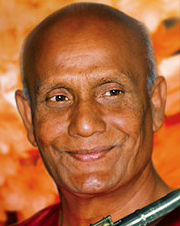Free music downloads from Radio Sri Chinmoy:
- Music for meditation
- Musical groups for daily inspiration
- Recital of spiritual aphorisms
- Easy mantras for you to sing (sheet music, recordings 1 – 2 – 3 – 4 – 5)
Writings by Sri Chinmoy, from the book “Meditation: Man-Perfection in God-Satisfaction”:
The outer music
Comes from an outer instrument.
The inner music
Comes from the heart.
The name of this inner music
Is oneness.
Music is the inner or universal language of God. In the spiritual world, next to meditation is music, the breath of music. Meditation is silence, energising and fulfilling. Silence is the eloquent expression of the inexpressible. Aldous Huxley says: “After silence, that which comes nearest to expressing the inexpressible is music.”
Silence is the source of everything. It is the source of music and it is music itself. Silence is the deepest, most satisfying music of the Supreme. Silence is like a stream that goes to one place and becomes a river, or to another place and becomes a brook, or to the sea where it is totally expanded.
Silence is the nest and music is the bird. The bird leaves the nest early in the morning and returns to the nest in the evening. Similarly, in the spiritual world, divine music comes from the inmost soul of silence.
- Sri Chinmoy performs on esraj
Soulful music immediately awakens and inspires our hearts because it embodies the Absolute Supreme. Soulful music is the Light that wants to express itself in a divine way. Even as darkness wants to manifest its authority on earth, Light also wants to manifest its Reality and Divinity in a specific way. Light is the soul of everything. Light is the soul of music, Light is the soul of love and Light is the soul of all art. When Light divinely manifests itself in the form of music, it is the music of the soul.
Music means Self-expansion and oneness. The Self expands through music. The Self that expands is not the individual self but the unlimited Self. Music is the expansion of unlimited Reality.
We can use music to help us in our spiritual life provided we know that music and the spiritual life are like twin brothers; we cannot separate them. How can we separate two fingers, two eyes? They sit side by side. If one eye is not functioning well, then we feel that our vision is imperfect. Similarly, music and the spiritual life must go together; one complements the other.
Music helps the spiritual seeker to go deep within to get the utmost satisfaction from life, from truth, from reality. The spiritual life, in turn, helps music to offer its capacity and its strength, which is the soul’s light, to the world at large.
- Sri Chinmoy on music as universal language:
When we listen to soulful music, or when we ourselves play soulful music, immediately our inner existence climbs up high, higher, highest. It climbs up and enters into something beyond. This Beyond is constantly trying to help us, guide us, mould us and shape us into our true transcendental image, our true divinity.
When we hear soulful music, or when we play a soulful piece of music, we feel a kind of inner thrill in our entire existence, from the soles of our feet to the crown of our head. A river is flowing through us, a river of consciousness, and this consciousness is all the time illumined.
Next to deep prayer or meditation, music is of paramount importance. Meditation is like a direct route, or shortcut, to the goal. Music is a road that is absolutely clear: it may be a little longer, but it is quite clear of obstacles. If we can play soulful music or hear soulful music, the power of our meditation increases. Soulful music adds to our aspiration.
Similarly, if a spiritual seeker wants to be a musician, even if he does not have a musical background, he will be able to be a good musician because prayer and meditation contain all capacities. You may never have studied music, but if you pray and meditate soulfully, then inside your prayer, inside your meditation, by the Grace of the Supreme, the power of music looms large. Then you can utilise this power in your own way.Each time soulful music is played, we get inspiration and delight.
In the twinkling of an eye, music can elevate our consciousness. But if we also pray and meditate, then we are undoubtedly more illumined and fulfilled than a music-lover who is not consciously leading a spiritual life. Each spiritual musician is consciously spreading God’s Light on earth. God is the cosmic Player, the eternal Player, and we are His instruments. It is the Supreme who makes the proper instrument. Then, it is He who makes the player play properly, and it is He who makes the musician.
Soulful and spiritual music really helps us; it feeds our inner life. Music has tremendous power. With fire we can burn ourselves, or we can cook and do many other good things. It is the same with music. Divine music immediately elevates our consciousness, whereas undivine music immediately lowers our consciousness and tries to destroy our sincere inner cry for a better spiritual life. The spiritual person will immediately be affected by this music. So music can change our consciousness provided it is the music that comes from the heart and enters into the heart. The music that touches the very depth of our heart can elevate our consciousness.
Mantras
I purify my body by chanting God’s name.
I purify my vital by serving God.
I purify my mind by
emptying my mind for God.
I purify my heart by meditating on God’s Compassion-Love.
A mantra is an incantation. It can be a syllable, a word, a few words or a sentence. When you repeat a mantra many times, it is called japa. A mantra represents a particular aspect of God, and each mantra has a special significance and inner power.
If you cannot enter into your deepest meditation because your mind is restless, this is an opportunity to utilise a mantra. You can repeat “Supreme” or Aum or “God” for a few minutes.
Also, if you get an attack on the emotional vital plane and wrong thoughts or wrong vibrations are entering into you, you can repeat Aum or the name of the Supreme. In this case try to do it as fast as possible. When you are trying to cleanse your mind of impurities, you must chant as if you were running to catch a moving train.
During regular japa, however, just say the mantra in a normal but soulful way. But do not prolong it too much; otherwise, you will not have time to chant the five hundred or six hundred times that may be necessary.




